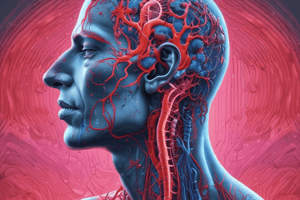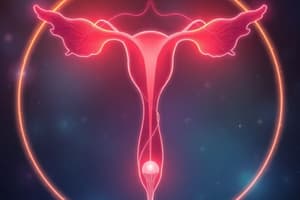Podcast
Questions and Answers
What is the first stage of the sexual response cycle?
What is the first stage of the sexual response cycle?
- Orgasm
- Resolution
- Arousal
- Desire (correct)
What is affected by taste, fantasy, memory, movement, and societal and cultural values?
What is affected by taste, fantasy, memory, movement, and societal and cultural values?
- Desire (correct)
- Arousal
- Orgasm
- Resolution
What is the physical response to desire in both males and females?
What is the physical response to desire in both males and females?
- Plateau
- Resolution
- Arousal (correct)
- Orgasm
What occurs during the plateau phase in males?
What occurs during the plateau phase in males?
What is a characteristic of female arousal?
What is a characteristic of female arousal?
What is a characteristic of orgasm in females?
What is a characteristic of orgasm in females?
What happens during the resolution phase in males?
What happens during the resolution phase in males?
What is a common effect of ageing on female sexual response?
What is a common effect of ageing on female sexual response?
What is a challenge in discussing sexual health with patients?
What is a challenge in discussing sexual health with patients?
What is important for healthcare providers to be aware of when discussing sexual health?
What is important for healthcare providers to be aware of when discussing sexual health?
Flashcards are hidden until you start studying
Study Notes
The Sexual Response Cycle
- The sexual response cycle consists of three stages: desire, orgasm, and resolution.
- Desire is spontaneous sexual interest, controlled by the brain, and includes sexual thoughts and erotic fantasies.
Desire
- Desire is affected by:
- Sight, sound, smell, touch, and taste
- Fantasy, memory, movement, and societal and cultural values
- Thoughts, feelings, and experiences (psychosexual medicine)
- Value judgment – a perception of good or bad
- Sexual desire can be triggered by various stimuli, such as sight, sound, smell, and touch.
Arousal and Excitement
- The body's physical response to desire differs between males and females.
- Arousal can last from minutes to hours, and can be lost and regained without progression.
- Common physiological responses in both sexes include:
- Raised blood pressure, pulse, and respiratory rate
- Flushing, nipple erection, genital and pelvic vascular engorgement, and muscle contraction
Female Arousal
- Female arousal is characterized by:
- Enlargement of breasts
- Erection of nipples
- Vasocongestion of the vaginal walls
- Vaginal lubrication
- Elongation and widening of the vaginal canal
- Tumescence and erection of the clitoris and labia
- Elevation of the cervix and uterus
Male Arousal
- Male arousal is characterized by:
- Penis erection
- Scrotum thickening and testes rising
- Sexual arousal does not always result in an erection
- Erection can occur during sleep
Plateau
- Plateau is the period of sexual excitement prior to orgasm, lasting up to 3 minutes.
- Plateau can be achieved, lost, and gained without orgasm.
- In males, plateau involves:
- Urethral sphincter contraction to prevent urine mixing with semen
- Pre-ejaculatory fluid (Cowper's gland) production
- Testes rising
- In females, plateau involves:
- 'Orgasmic platform'
- Increased Bartholin's secretions
- Continuing changes in the uterus, labia, areola, and nipples
- Clitoris sensitivity and withdrawal
Orgasm
- Orgasm is the conclusion of the plateau phase, releasing sexual tension and endorphins.
- Orgasm involves quick cycles of muscle contractions, with peak responses, blood pressure, pulse, and tension.
- Orgasm is accompanied by an euphoric sensation.
Orgasm in Males
- Orgasm in males is usually associated with ejaculation.
- Single via resolution involves 3-6 contractions of the urethra, pelvic floor, and anus.
Orgasm in Females
- Orgasm in females involves multiple contractions of muscles of the uterus, vagina, anus, and pelvic floor.
- Increased vaginal secretions occur during orgasm.
Resolution
- Resolution is characterized by relaxation, decreased blood pressure, pulse, and respiratory rate.
- Age affects the refractory period.
- Resolution is now visible on MRI.
Resolution in Males
- Resolution in males involves:
- Nipples and penis softening
- Scrotum relaxing
- Testes dropping
Resolution in Females
- Resolution in females involves:
- Blood vessels dilating
- Pelvic organs draining
- Cervix opening and dropping into the vagina (closes after 30 minutes)
Sexual Gratification and Fulfillment
- Penetration is not necessary for sexual gratification.
- Orgasms vary in intensity, from spasms to relaxation.
- Some women do not experience orgasm.
Effects of Ageing
- Age affects sexual response in both males and females.
- In males, ageing results in:
- Delayed erections
- Less firm erections
- Longer excitement stage and interval to ejaculation
- More direct stimulation needed to achieve erection
- Shorter plateau to ejaculation with smaller volume
- Longer refractory period
- In females, ageing results in:
- Reduced lubrication
- Reduced vascular engorgement
- Reduced muscle tension
- Reduced libido
Consultation Issues
- Consultation issues in sexual health include:
- Embarrassment
- Lack of language to describe emotions, sensations, and body parts
- Assumptions about gender and experience
- What is considered 'normal'
Attitudes, Values, and Bias
- Be aware of cultural and subcultural norms, which are open to value judgments.
- Consider diversity among orientations, emotional attractions, and complex interrelations.
- Sociocultural factors influence sexual attitudes and behaviors.
Studying That Suits You
Use AI to generate personalized quizzes and flashcards to suit your learning preferences.




